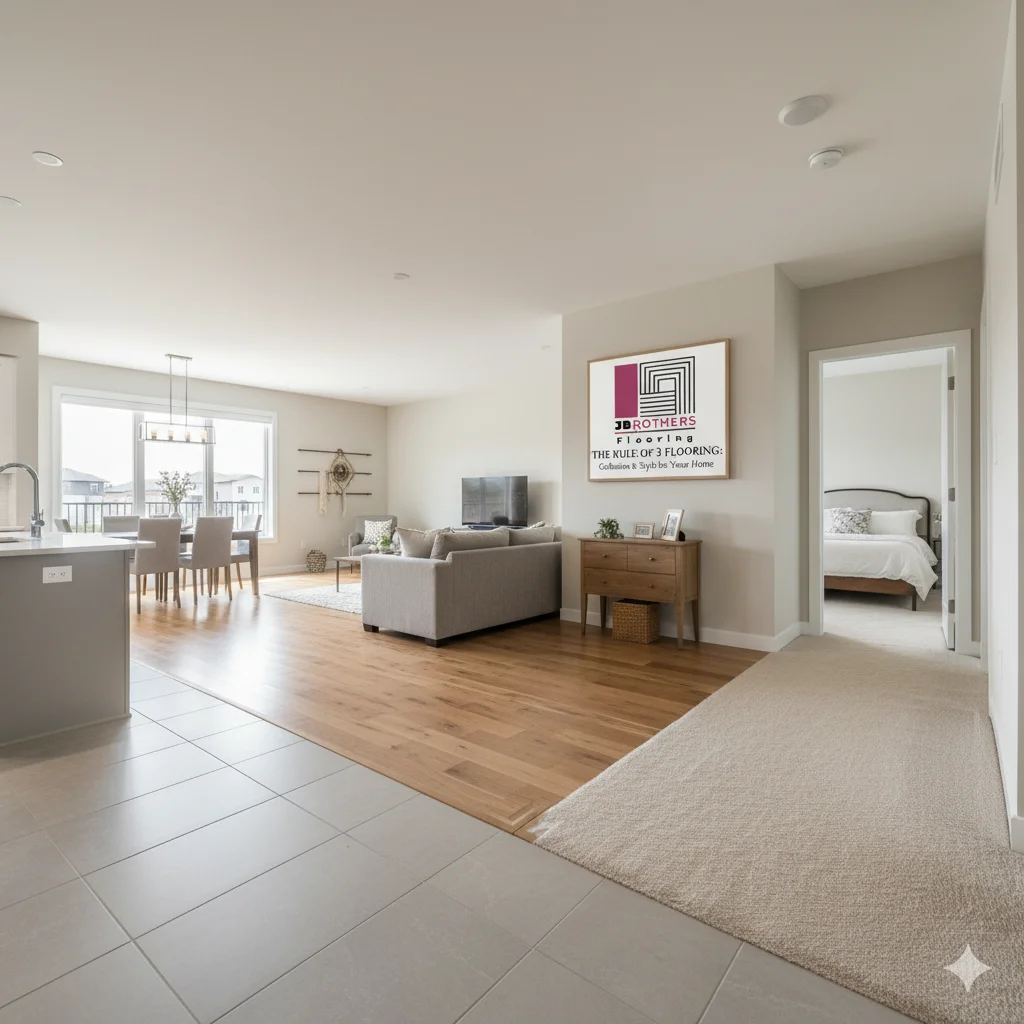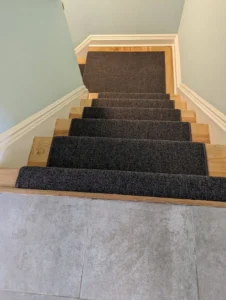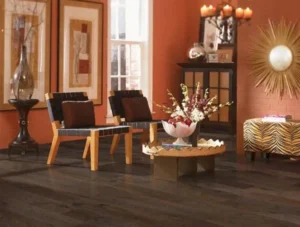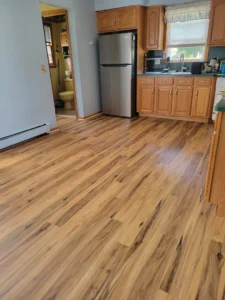The best kitchen flooring in New Jersey includes luxury vinyl plank, porcelain tile, and engineered hardwood for superior water resistance, durability, and style. These materials handle New Jersey’s humid summers and cold winters while withstanding daily kitchen wear from cooking, spills, and foot traffic. Your choice depends on budget, moisture exposure levels, maintenance commitment, and design preferences. J Brothers Flooring helps homeowners across Middlesex County and beyond select the optimal kitchen flooring solutions.
Key Takeaways
Which flooring works best in New Jersey kitchens?
Luxury vinyl plank and porcelain tile lead choices due to 100% waterproofing, scratch resistance, humidity tolerance, and low maintenance requirements, perfect for NJ climate conditions.
How long does kitchen flooring last in New Jersey?
Porcelain tile lasts 50+ years, engineered hardwood 30-50 years, luxury vinyl 15-25 years, and laminate 10-20 years, depending on quality and maintenance practices.
Is hardwood suitable for New Jersey kitchens?
Engineered hardwood offers better moisture resistance than solid wood, handling NJ humidity fluctuations while requiring careful spill cleanup and periodic floor refinishing every 7-10 years.
What’s the most affordable kitchen flooring?
Laminate and luxury vinyl plank offer the best value, combining affordable pricing with durability, waterproofing, and realistic wood or stone appearances at competitive costs.
Does kitchen flooring increase NJ home value?
Quality kitchen flooring like engineered hardwood, porcelain tile, or luxury vinyl significantly boosts resale value while improving functionality and aesthetic appeal statewide.
How does the NJ climate affect kitchen flooring?
Humid summers and cold winters cause expansion and contraction, requiring materials with dimensional stability like vinyl, tile, or engineered wood that handle moisture and temperature fluctuations.
Can I install kitchen flooring myself in NJ?
Luxury vinyl plank and laminate allow confident DIY installation with click-lock systems, though professional installation ensures proper waterproofing, subfloor preparation, and warranty coverage.
Moisture-Resistant Kitchen Flooring for New Jersey Climate
New Jersey’s climate presents unique challenges with humid summers averaging 70-80% humidity and cold winters requiring kitchen flooring that handles dramatic temperature and moisture fluctuations. Waterproof materials prevent warping, swelling, mold growth, and structural damage that moisture-sensitive alternatives experience in NJ’s challenging conditions. Modern waterproof Kitchen flooring combines practical protection with attractive designs mimicking natural wood, stone, and contemporary patterns suiting any kitchen style from traditional to modern. Professional guidance from J Brothers Flooring throughout Somerset County ensures your kitchen receives flooring engineered specifically for New Jersey’s demanding environmental conditions.
New Jersey’s Growing Kitchen Renovation Market
New Jersey’s 9.3 million residents across 21 counties create robust demand for quality kitchen renovations and professional flooring services, meeting diverse homeowner needs. The state’s median household income of $89,296 ranks among America’s highest, supporting quality investments in durable kitchen upgrades that enhance daily life. Property values averaging $417,000 statewide motivate strategic improvements with updated kitchens significantly impacting resale appeal in competitive markets from Bergen to Cape May counties. Young families and professionals value low-maintenance materials fitting busy lifestyles while maximizing functionality, durability, and aesthetic appeal throughout their homes. This combination of financial capacity, renovation priorities, and quality expectations creates strong demand for expert kitchen flooring consultation throughout New Jersey communities.
From Colonial Homes to Modern Kitchens
New Jersey’s rich architectural heritage spanning 350+ years includes Colonial, Victorian, and Craftsman homes requiring thoughtful kitchen updates balancing historical character with contemporary performance. The Garden State’s proximity to Philadelphia and New York City historically made it a hub for architectural innovation, combining traditional craftsmanship with modern conveniences. Historic home renovations increasingly incorporate advanced materials like waterproof vinyl, mimicking vintage patterns or traditional tile designs, honoring period aesthetics while delivering modern durability. Coastal communities face additional moisture challenges from ocean humidity, requiring extra protection that professional installers understand and address properly. This unique blend of historical respect, regional architecture, and modern performance makes professional flooring selection essential for homeowners updating kitchens throughout New Jersey.
New Jersey Homeowners Trust J Brothers Flooring
Jim DelGaldo shares on Google reviews: If I could give Jack and his J Brothers Flooring team 10 stars, I would because my wife and I cannot be happier with our new high-quality floors, and Jack handled everything perfectly from measurement through installation completion. Olgita emphasizes in her review: The J Brothers Flooring team was super professional, knowledgeable, understood exactly what I wanted, and completed my floors in less than two days with more reasonable pricing than big box competitors. Bree Kokolus states on Yelp reviews: Impressive work throughout my house, including hardwood floors, with customer service quality even better than the installation workmanship, demonstrating true commitment.
New Jersey Kitchen Flooring Essentials
- Luxury Vinyl Plank provides 100% waterproofing with protective wear layers resisting scratches, handling NJ humidity fluctuations, and offering realistic wood appearances lasting 15-25 years with minimal maintenance requirements, ideal for busy families.
- Porcelain Tile delivers unmatched durability, resisting water, stains, and wear for 50+ years, handling temperature extremes while requiring professional installation and periodic grout sealing, maintaining appearances and waterproof properties throughout decades.
- Engineered Hardwood offers authentic wood beauty with better moisture stability than solid hardwood, requiring careful spill cleanup and refinishing every 7-10 years while adding significant property value throughout New Jersey’s competitive real estate market.
- Climate Considerations show NJ’s 70-80% summer humidity and freezing winters demand materials with dimensional stability, preventing expansion, contraction, warping, or damage from seasonal temperature and moisture fluctuations affecting interior environments.
- Professional Installation ensures proper waterproofing techniques, subfloor moisture testing, appropriate underlayment selection, and warranty-compliant methods maximizing performance throughout materials’ expected lifespans in challenging New Jersey conditions.
- Cost-Benefit Analysis balances material prices, professional installation, maintenance requirements, and expected lifespan, determining true lifetime costs beyond initial purchase for informed budget decisions matching priorities.
Which Type of Flooring Is Best for a Kitchen?
The best kitchen flooring balances complete waterproofing, exceptional durability, easy maintenance, comfortable feel, attractive appearance, and budget considerations, matching New Jersey households’ specific needs and priorities. Luxury vinyl plank leads recommendations for most NJ kitchens due to 100% waterproof construction, realistic appearances, cushioned comfort, and affordable pricing with DIY-friendly installation options, reducing total costs. Porcelain tile excels in extreme durability with complete moisture immunity lasting 50-100 years, though requiring professional installation plus periodic grout sealing to maintain performance and appearances. Engineered hardwood flooring delivers authentic wood beauty, adding significant property value with better moisture stability than solid wood, though demanding careful spill cleanup and maintenance commitment.
What Is the Current Trend in Kitchen Flooring?
Current kitchen flooring trends in New Jersey favor wide-plank luxury vinyl mimicking natural wood, large-format porcelain tiles minimizing grout lines, and light gray or whitewashed engineered hardwood creating bright, spacious feels. Wood-look tile continues gaining popularity, combining authentic appearances with tile’s waterproof durability and easy maintenance, appealing to practical homeowners prioritizing performance without sacrificing style. Waterproof laminate with realistic embossed textures now mimics high-end hardwood convincingly at affordable prices, making luxury aesthetics accessible to budget-conscious renovators throughout the state. Bold geometric patterns and textured finishes add visual interest in modern kitchens, while classic subway tiles remain timeless choices for traditional spaces across Union County communities.
Luxury Vinyl Plank Dominating New Jersey Kitchens
Luxury vinyl plank flooring dominates modern kitchen applications throughout New Jersey due to exceptional waterproofing, realistic appearances, and practical maintenance requirements that busy families appreciate. The multi-layer construction includes 12-20 mil protective wear layers resisting scratches from dropped utensils, pet claws, and daily foot traffic without visible damage accumulating over the years. Rigid core technology using stone-polymer composite provides dimensional stability, preventing expansion or contraction from NJ’s humidity fluctuations and temperature swings affecting interior environments seasonally. Complete waterproofing protects against inevitable spills, dishwasher leaks, and tracked-in moisture from rain or snow that destroys moisture-sensitive alternatives requiring costly replacements.
Porcelain Tile Excellence for New Jersey Durability
Tile flooring represents the gold standard for kitchen durability, resisting water, scratches, stains, and impact better than competing materials available today throughout New Jersey markets. Manufacturing processes firing tiles at extreme temperatures create incredibly dense surfaces absorbing less than 0.5% water, making porcelain truly waterproof, handling coastal humidity and indoor moisture exposure. The hardness rating approaching natural stone allows furniture dragging, dropped pans, and constant foot traffic without surface damage visible on softer materials after years of use. Professional installation ensures proper substrate preparation, appropriate thin-set application, and correct grouting, preventing cracks and failures throughout Hunterdon County installations.
Kitchen Flooring Options Comparison Table
| Flooring Type | Water Resistance | NJ Climate Suitability | Durability | Lifespan | Maintenance | Comfort | Best For |
| Luxury Vinyl Plank | 100% Waterproof | Excellent | Excellent | 15-25 years | Very Low | Good | All NJ kitchens, busy families |
| Porcelain Tile | 100% Waterproof | Outstanding | Outstanding | 50+ years | Low-Medium | Fair | Maximum durability needs, coastal homes |
| Engineered Hardwood | Water-Resistant | Very Good | Very Good | 30-50 years | Medium-High | Excellent | Property value focus, careful use |
| Ceramic Tile | Water-Resistant | Very Good | Excellent | 30-50 years | Low-Medium | Fair | Traditional kitchens, moderate budgets |
| Waterproof Laminate | Water-Resistant | Good | Good | 15-25 years | Low | Good | Budget-conscious, low-moisture areas |
| Natural Stone | Waterproof (sealed) | Excellent | Excellent | 50-100 years | Medium-High | Fair | Luxury kitchens, upscale homes |
| Cork | Water-Resistant | Fair | Good | 20-30 years | Medium | Excellent | Small kitchens, comfort priority |
| Traditional Laminate | Moisture-Sensitive | Fair | Fair-Good | 10-20 years | Low | Good | Avoid in NJ kitchens, moisture issues |
Engineered Hardwood for Authentic New Jersey Beauty
Engineered hardwood provides authentic wood aesthetics with significantly better moisture stability than solid hardwood, making it viable for New Jersey kitchen applications when proper care is maintained consistently. The layered construction includes real hardwood veneer tops over plywood cores, resisting expansion and contraction from humidity and temperature changes affecting NJ homes seasonally. The thickness of wear layers typically 2-6mm allows refinishing 1-3 times during the floor’s lifespan, refreshing appearances without complete replacement like vinyl or laminate products require. Factory-applied finishes, including aluminum oxide coatings, provide superior scratch protection compared to site-finished solid hardwood, extending the time between refinishing needs in busy kitchen environments.
What Is the Rule of 3 Flooring?
The rule of 3 flooring guideline recommends using a maximum of three different flooring types throughout your entire home, creating visual cohesion while allowing appropriate material selection for varying needs. This principle prevents choppy, disjointed appearances that too many flooring changes create, making homes feel smaller and less unified than cohesive designs flowing seamlessly between connected spaces. Common applications include waterproof vinyl or tile in kitchens and bathrooms, hardwood or luxury vinyl in living areas, and carpet in bedrooms, providing suitable performance matching each space’s demands. Professional designers at J Brothers Flooring help implement the rule effectively throughout Princeton County homes.

What Is the Most Durable Material for a Kitchen Floor?
Porcelain tile ranks as the most durable kitchen flooring material available, resisting wear, scratches, moisture, stains, and impacts better than any competing option throughout New Jersey markets. The extreme density from high-temperature firing creates surfaces hard enough to withstand decades of heavy foot traffic, dropped cookware, and daily kitchen activities without visible deterioration. Complete waterproofing, when properly sealed, protects against spills, leaks, humidity, and moisture exposure that threatens less durable alternatives requiring premature replacement throughout their lifespans. The 50-100 year lifespan dramatically exceeds other options, eliminating replacement costs and disruption multiple times during home ownership periods, saving money long-term.
Waterproof Laminate Innovations
Laminate flooring technology has dramatically advanced, improving moisture tolerance, making modern waterproof laminate viable for New Jersey kitchens when installed and maintained properly following manufacturer guidelines. Revolutionary waterproof cores replace traditional fiberboard with polymer-based materials, resisting water penetration through edges and seams that destroyed older laminate products within months. Edge sealing technologies create barriers preventing moisture infiltration at vulnerable connection points where planks join, significantly extending lifespans in moisture-prone kitchen environments. The layered construction includes photographic layers mimicking wood or stone, topped with protective wear layers rated AC4 or AC5 for residential kitchen applications.
Natural Stone Luxury Options
Natural stone, including granite, marble, slate, and travertine, provides luxury, durability, and unique beauty perfect for upscale New Jersey kitchens prioritizing high-end finishes that increase property values significantly. The density and hardness of stone materials resist scratches, dents, and wear from decades of foot traffic without visible degradation or performance decline, affecting softer materials over time. Each stone piece features unique natural patterns, colors, and characteristics, creating one-of-a-kind floors impossible to replicate with manufactured uniformity mass-produced in factories. Granite provides extreme hardness and stain resistance, perfect for kitchens handling heavy use, though premium grades command significant investment justified by exceptional performance. Installation complexity requires professional expertise, ensuring proper substrate preparation throughout Piscataway County installations.
New Jersey Climate Impact on Kitchen Flooring
New Jersey’s humid subtropical climate with hot, muggy summers and cold, snowy winters creates unique challenges requiring kitchen flooring materials to handle dramatic seasonal temperature and moisture fluctuations affecting interior environments. Summer humidity averaging 70-80% causes expansion in moisture-sensitive materials, including solid hardwood and traditional laminate, leading to buckling, warping, or gapping between planks without proper acclimation. Winter heating systems dry indoor air dramatically, causing contraction and separation in materials lacking dimensional stability throughout seasonal cycles, affecting New Jersey homes annually. Professional guidance from J Brothers Flooring throughout Elizabeth County ensures material selection accounting for specific regional climate challenges.
Cost Analysis for New Jersey Kitchen Flooring
Understanding total costs, including materials, installation, maintenance, and expected lifespan, helps New Jersey homeowners make informed financial decisions, maximizing value while meeting budget constraints realistically. Luxury vinyl material costs range $2-7 per square foot, depending on quality, brand, and features, including waterproof cores and premium wear layers rated for heavy commercial traffic. Professional installation adds $2-4 per square foot, or DIY installation saves this labor cost entirely for confident homeowners with basic skills and appropriate tools. Ceramic tile materials cost $2-8 per square foot while porcelain tiles range $3-15 per square foot, depending on size, finish, and design complexity, from standard to custom.
Professional Installation vs DIY Considerations
Installation quality dramatically affects how well kitchen flooring performs throughout its expected lifespan, making installer selection as important as material choice for long-term satisfaction and warranty coverage. Professional installation from J Brothers Flooring ensures proper waterproofing techniques, subfloor moisture testing, appropriate underlayment selection, and warranty-compliant methods maximizing performance in challenging NJ conditions. Proper acclimation allows materials to adjust to the installation environment temperature and humidity for 48-72 hours, preventing expansion, contraction, or gapping issues from emerging after completion. Correct adhesive selection and application ensure permanent bonds between flooring and subfloors, preventing delamination, hollow spots, or movement under traffic loads, compromising performance.
Maintenance Requirements by Material
Understanding maintenance requirements before selecting kitchen flooring prevents surprises and ensures you choose materials that match your cleaning preferences and time availability throughout busy schedules. Vinyl tile flooring requires only regular dry sweeping or vacuuming, removing abrasive particles, plus occasional damp mopping with pH-neutral cleaners, avoiding harsh chemicals. Porcelain and ceramic tile demand grout sealing every 1-2 years, preventing staining and moisture penetration, plus regular cleaning with appropriate products, avoiding harsh acids that damage surfaces. Engineered and solid hardwood need immediate spill cleanup, regular sweeping, occasional damp mopping with wood-specific cleaners, and refinishing every 7-10 years, maintaining protective finishes.
Property Value Impact Throughout New Jersey
Kitchen flooring choices significantly impact property values and buyer appeal when eventually selling homes throughout New Jersey’s competitive real estate markets spanning urban, suburban, and coastal communities. High-quality flooring, including porcelain tile, engineered hardwood, or premium luxury vinyl, adds substantial resale value, appealing to quality-conscious buyers prioritizing durability and aesthetics over budget alternatives. The premium appeal stems from flooring’s reputation for quality, longevity, and waterproof performance buyers recognize as superior investments protecting their purchases long-term. Well-maintained flooring in good condition demonstrates overall property care, suggesting other systems and components received similar attention throughout ownership periods, reassuring potential buyers.
Related Kitchen Flooring Services
Beyond kitchen flooring installation, J Brothers Flooring offers comprehensive services ensuring New Jersey homes receive complete professional attention throughout every renovation phase from planning through completion. Carpet installation services provide comfortable, durable solutions for bedrooms, living rooms, and family spaces, complementing kitchen flooring throughout homes cohesively. Subfloor inspection and preparation services identify moisture issues, level uneven surfaces, and correct structural problems, ensuring optimal installation foundations protecting long-term investments. Custom transition and molding fabrication creates seamless connections between kitchen flooring and adjacent rooms, different materials, and varying floor heights, ensuring professional appearances.
Conclusion
Choosing the best kitchen flooring for your New Jersey home requires carefully balancing water resistance, durability, climate suitability, maintenance requirements, comfort, aesthetics, and budget constraints with your household’s specific needs and priorities. Luxury vinyl plank, porcelain tile, and engineered hardwood each offer distinct advantages suiting different situations, lifestyles, and performance requirements throughout the state’s diverse communities. The decision impacts daily comfort, maintenance workload, property value, and long-term satisfaction, making careful material selection and professional installation worthwhile investments, enhancing your home. Contact J Brothers Flooring today for free consultations, assessing your kitchen flooring needs, and discovering how professional expertise creates beautiful, durable results, improving your New Jersey home’s functionality, style, and value for decades.
Frequently Asked Questions
Which type of flooring is best for a kitchen?
Luxury vinyl plank and porcelain tile rank best for New Jersey kitchens due to complete waterproofing, excellent durability, humidity tolerance, low maintenance, and attractive appearances, handling daily kitchen demands.
What is the current trend in kitchen flooring?
Wide-plank luxury vinyl mimicking natural wood, large-format porcelain tiles minimizing grout lines, light gray engineered hardwood, and heated floor systems dominate 2025 New Jersey kitchen trends.
What is the rule of 3 flooring?
Use a maximum of three different flooring types throughout your home, creating visual cohesion while allowing appropriate material selection for varying room requirements and traffic patterns.
What is the most durable material for a kitchen floor?
Porcelain tile ranks most durable, resisting wear, scratches, moisture, stains, and impacts for 50-100 years without visible deterioration or performance decline in New Jersey kitchens.
How does the NJ climate affect kitchen flooring?
New Jersey’s humid summers and cold winters cause expansion and contraction, requiring materials with dimensional stability like vinyl, tile, or engineered wood that handle moisture fluctuations.
Can I install kitchen flooring myself?
Luxury vinyl plank and laminate allow confident DIY installation with click-lock systems, though professional installation ensures proper waterproofing, subfloor preparation, and warranty coverage.
How much does kitchen flooring cost in NJ?
Costs vary by material, with vinyl $4-11, tile $7-20, and engineered hardwood $7-20 per square foot installed, depending on quality and installation complexity.
Is engineered hardwood good for NJ kitchens?
Yes, engineered hardwood handles NJ humidity better than solid wood with better moisture stability, though requiring careful spill cleanup and periodic refinishing every 7-10 years.
What kitchen flooring adds the most value?
Engineered hardwood and high-quality porcelain tile add significant resale value while luxury vinyl provides excellent performance without premium price tags for New Jersey homes.
How long does installation take?
Professional installation takes 1-3 days, depending on kitchen size and material choice, with vinyl installing fastest and tile requiring the longest timeframes for proper curing.



